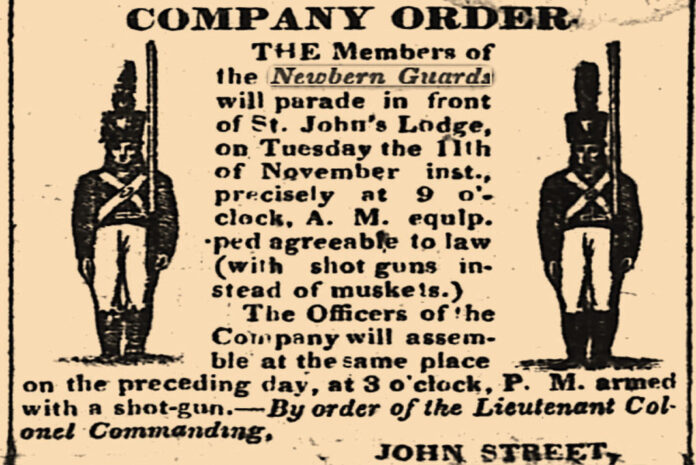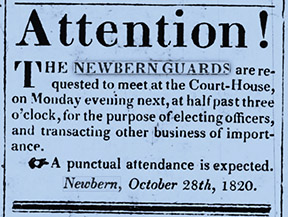by Edward Ellis, Special Correspondent
The curious wording of the Second Amendment to the U.S. Constitution has stirred endless debate. It reads: “A well-regulated Militia, being necessary to the security of a free State, the right of the people to keep and bear Arms, shall not be infringed.”
There’s plenty of evidence that “a well-regulated militia” was part and parcel of everyday life in long-ago New Bern. Take the nearby “company order” by Capt. John Street from the Newbern Sentinel of 1828 instructing the Newbern Guards to parade in front of St. John’s Lodge. The men were commanded to turn out with shotguns and to leave those muskets at home.
A December 1821 announcement from the same paper ordered the “town militia” to assemble in winter uniforms with “twelve rounds of cartridges loaded with shot and ball.” Capt. T.A. Pasteur warned that the men were to appear “precisely at half past two oclock, P.M.; equipped at the law directs; or you will be fined.”
Another broadside reproduced here summoned the local militia to meet at the courthouse to elect officers and transact other important business. A pointing finger emphasized the need to be prompt.
In the southern states at the time of the Civil War, these militias morphed into units of the Confederate army. But even after the war, the militia system continued unabated. An article from the Daily Review of Wilmington, dated November 10, 1877, informs us that four militia units were in operation at New Bern. The Oak City Blues, the Newbern Rifle Cadets, the Newbern Guards, and the Oberlin Vance Guard were serving as the Fourth Battalion of the North Carolina State Guard.
Through the years, local militia control passed to the state. The N.C. State Guard under a variety of names, including the State Defense Militia, eventually grew to be the North Carolina National Guard.
Today, the Guard, which traces its history back to local colonial militias, is under the command of the governor for action during natural disasters or civil unrest.


